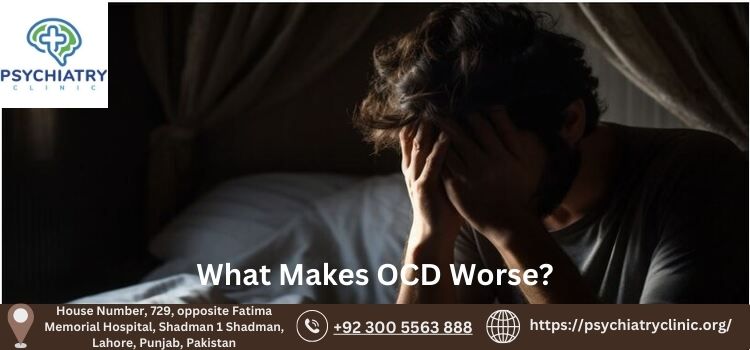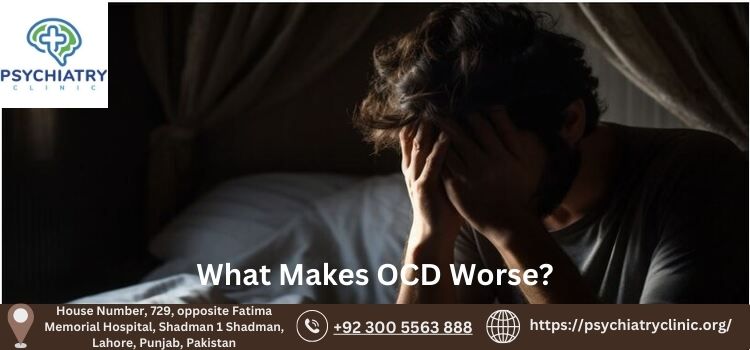What Makes OCD Worse? Comprehensive Guide
The most asked question by people What Makes OCD Worse? There are several factors that can make Obsessive-Compulsive Disorder (OCD) worse. OCD is a mental health disorder characterized by unwanted and intrusive thoughts, as well as repetitive behaviors. It can have a significant impact on an individual’s daily life, causing distress and interfering with their ability to function. While the exact cause of OCD is unknown, certain factors can worsen symptoms and make it more challenging to manage.
In this section, we will explore some common triggers that may exacerbate OCD.
Let’s dive in to get more
What Makes OCD Worse?

OCD can be a chronic condition, and its severity can vary from person to person. The factors that can make the OCD worse are mentioned below:
Stress
One of the most significant contributors to worsening OCD symptoms is stress. Stress can come from various sources, such as work, relationships, financial problems, and even everyday tasks. When individuals with OCD experience stress, they may feel more overwhelmed and anxious, leading to an increase in obsessions and compulsions. It’s essential for people with OCD to learn healthy coping mechanisms to manage stress effectively. This can include practicing relaxation techniques, seeking support from loved ones, and engaging in activities that help reduce stress levels.
Pregnancy and childbirth
Experiencing pregnancy and giving birth can also worsen OCD symptoms for some individuals. The hormonal changes that occur during pregnancy and postpartum can affect brain chemistry, potentially triggering or intensifying obsessive thoughts and compulsive behaviors. Additionally, the added responsibility of caring for a newborn can increase stress levels, further exacerbating OCD symptoms. It’s crucial for pregnant individuals with OCD to seek support from their healthcare providers and loved ones to manage their symptoms effectively.
Lack of Sleep
Another factor that can worsen OCD is a lack of sleep. Sleep plays a vital role in our mental health and overall well-being. When individuals with OCD don’t get enough rest, it can make them feel more anxious and irritable, making it harder to cope with their symptoms. It’s crucial for people with OCD to prioritize getting enough sleep and establish a regular sleep schedule. This can help reduce stress and improve mood, making it easier to manage OCD symptoms.
Substance Abuse
Substance abuse can also worsen OCD symptoms. Individuals with OCD may turn to substances such as alcohol or drugs, thinking they will provide temporary relief from their obsessive thoughts and compulsive behaviors. However, this can make symptoms worse in the long run and may lead to addiction and other mental health issues. It’s essential for individuals with OCD to seek professional help if they are struggling with substance abuse.
Isolation
Isolation is another common trigger for worsening OCD. People with OCD may feel embarrassed or ashamed of their symptoms, leading them to isolate themselves from others. However, this can make symptoms worse as they may not have a support system to help them cope and manage their disorder effectively. It’s essential for individuals with OCD to seek support from loved ones, join support groups, and participate in social activities to combat feelings of isolation.
Lack of Treatment
Lastly, not seeking proper treatment for OCD can also make it worse. Without professional help, individuals with OCD may struggle to manage their symptoms and may not have access to effective treatment methods. It’s essential for people with OCD to seek therapy and medication, if needed, to effectively manage their disorder. With the right treatment, individuals with OCD can learn to cope with their symptoms and improve their quality of life.
Overall, it’s crucial for individuals with OCD to identify their triggers and develop healthy coping strategies to manage them effectively. Seeking help from professionals and loved ones can also make a significant difference in managing this disorder.
Menstruation
For individuals assigned female at birth, menstruation can also worsen OCD symptoms. The hormonal changes that occur during the menstrual cycle can potentially trigger or intensify obsessive thoughts and compulsive behaviors. It’s important for individuals with Obsessive Compulsive Disorder to track their menstrual cycle and communicate any changes in symptoms with their healthcare provider to develop a personalized management plan. They may also find it helpful to practice relaxation techniques and self-care during this time.
Does OCD get worse with age?
Many people wonder if OCD gets worse with age. While it’s possible for symptoms to change or intensify as individuals age, there is no clear evidence that OCD worsens over time. However, without proper treatment and management, symptoms may become more challenging to cope with and impact daily life more significantly. It’s important for individuals with OCD to continue seeking professional help and practicing self-care to effectively manage their symptoms, regardless of their age.
How to stop your OCD from getting worse?
If you have Obsessive Compulsive Disorder, there are steps you can take to prevent your symptoms from getting worse. Here are some helpful tips:
Seek professional help:
Therapy and medication can be highly effective in managing OCD symptoms. It’s essential to work with a mental health professional who specializes in treating Obsessive Compulsive Disorder.
Practice self-care:
Engage in activities that help reduce stress levels, prioritize getting enough sleep, and maintain a healthy lifestyle.
Identify triggers:
Keep track of your triggers and develop healthy coping mechanisms to manage them effectively. This may include practicing relaxation techniques or seeking support from loved ones.
Educate yourself:
Learn more about Obsessive Compulsive Disorder and how it affects you. Understanding your disorder can help you better manage your symptoms.
Seek support:
Joining support groups or talking to loved ones who understand and support you can help combat feelings of isolation and provide a strong support system.
Stay consistent with treatment:
It’s crucial to continue therapy and medication, if prescribed, even when feeling better. This can prevent symptoms from worsening in the long run.
Remember, everyone’s experience with Obsessive Compulsive Disorder is different, and it’s essential to find what works best for you.
Conclusion
The most asked question by people What Makes OCD Worse? OCD symptoms can worsen due to various factors such as pregnancy, lack of sleep, substance abuse, isolation, and not seeking proper treatment. It’s important for individuals with OCD to identify their triggers and develop healthy coping strategies, seek support from professionals and loved ones, and continue with treatment to effectively manage their symptoms.
Educating yourself about this disorder and staying consistent with self-care can also help prevent symptoms from worsening. With proper management, individuals with this disease can lead fulfilling lives and effectively manage their disorder. So, it is crucial to prioritize mental health and seek help when needed.
FAQs
Frequently asked questions by people.
What habits help with OCD?
There are several habits that can help with managing OCD symptoms, such as establishing a regular sleep schedule, practicing relaxation techniques, seeking support from loved ones and professionals, and staying consistent with therapy and medication.
What causes your OCD to get worse?
Several factors can cause OCD symptoms to worsen, such as hormonal changes, pregnancy, lack of sleep, substance abuse, isolation, and not seeking proper treatment.
Can OCD ever go away?
While there is currently no cure for OCD, the symptoms can be effectively managed through therapy and medication. With proper treatment and management, individuals with OCD can lead fulfilling lives.
At what age is OCD worse?
There is no specific age at which OCD may become worse. Symptoms can change or intensify as individuals age, but it’s essential to continue seeking help and managing the disorder regardless of age.

